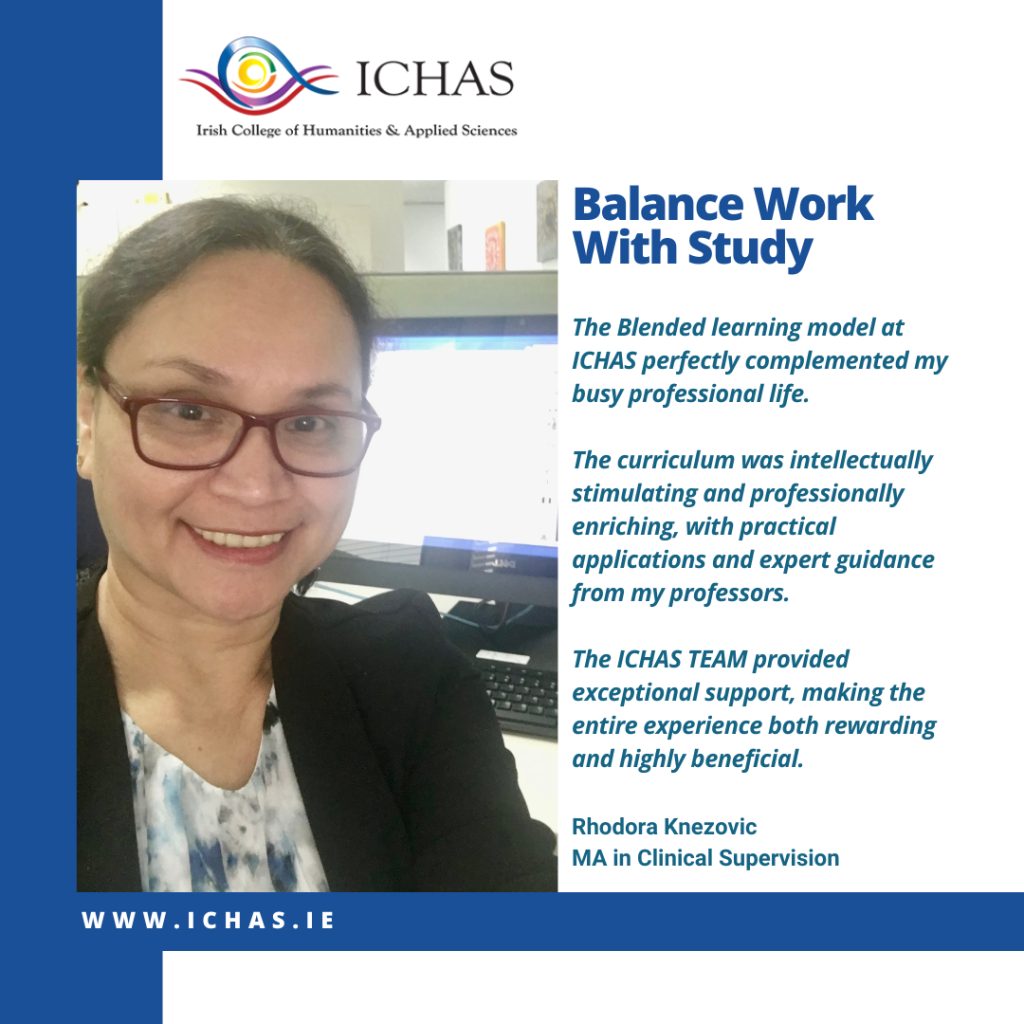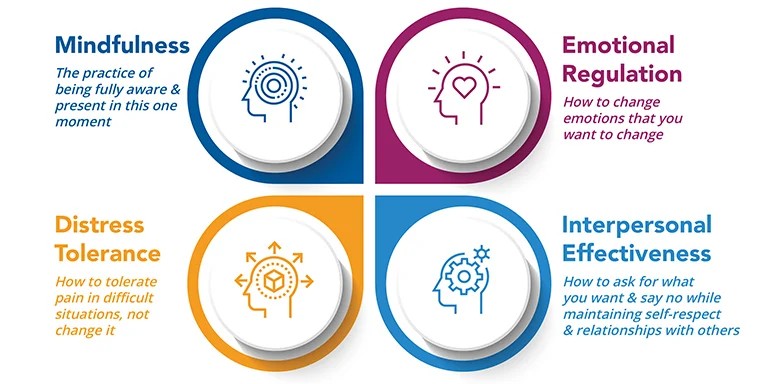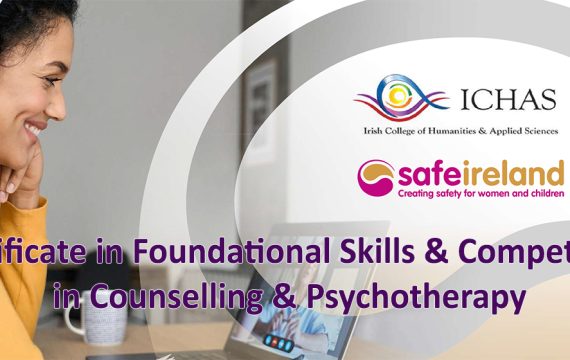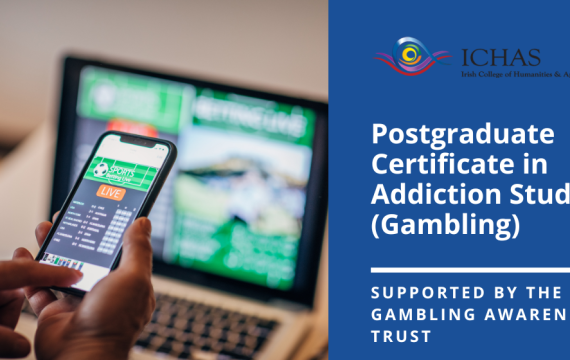
M.A. in Clinical Supervision in Professional Practice
The area of clinical supervision is evolving as one of significant professional interest within the Irish health and social care setting. Education and government policy demands that all professions who rely in their day to day practice on a range of theoretical perspectives maintain or put in place a framework to accommodate the acquisition and continued maintenance of higher order skills to underpin their practice as well as having educational progression routes to support their professional development and provide opportunities to enhance their own professional knowledge base.
Ryan (2008) traced the evolution of nursing as an academic discipline in Ireland, noting that the journey towards academic professionalisation accelerated since the 1960’s when programmes in higher educational institutions became available for nurses.
Recognising trends in the areas of Nursing, Social Care, Counselling and Psychotherapy trends, it is important that there are opportunities for professionals to study clinical supervision up to Major Award level at Level 9 on the NFQ.
This programme is designed to equip students with the knowledge, skills and attitudes required to become confident, critical, analytical and reflective practitioners who are able to make maximum use of resources, including research in their day-to-day practice.
This Masters in Clinical Supervision in Professional Practice enables learners to critically evaluate institutionalised practices and values, and act as agents for challenge and change in their professional contexts as well as supporting individual practitioners to enhance professional performance and ensure their professional practice adheres to ‘best-practice’ guidelines.
-
Award Title: M.A. in Clinical Supervision in Professional Practice
-
Duration: 1 Year (Full time) & 2 Years (Part Time)
This programme will facilitate learners to evolve to a level of expert practice in the context of inter, intra and trans- disciplinary clinical supervision models and driven by principles of holism. The programme is based on a philosophy which emphasises the perspective that the techniques and approaches to clinical supervision in Professional Practice should be always considered within a methodical approach which involves the coherent integration of theory and practice into a fuller evolving model of engagement and professional support. In that context, this clearly suggests that practitioners of clinical supervision should have appropriate knowledge of the important influences and models of clinical supervision as well as opportunities to develop competence within differing paradigms and approaches.
It is assumed that development in professional competence and expertise is an evolving process throughout students’ theory and practice integration and synthesis – which is influenced by factors such as competence, experience, context and personal choice.
The programme is also based on the following premises and beliefs:
- The relationship within the clinical supervisory engagement is of fundamental importance as a medium for change.
- The belief that clinical supervision can be discipline specific or interdisciplinary in nature.
- Open and supportive professional dialogue and exploration is essential in clinical supervision.
- The fact that respect for difference and an ability to work with diversity are inherent aspects of positive clinical supervision.
- A belief in the transpersonal dimension to an individual’s life and professional practice as well as the individual’s sovereignty and autonomous responsibility for self and professional judgements and actions.
- A belief in the significance of social relationships in setting the framework in which individuals operate in professional practice.
- An appreciation of the importance of socio-political awareness and an understanding of the practitioner’s experience, personal beliefs and values in professional practice settings.
The programme is aimed at learners who wish to develop their professional competence in clinical supervision of professional practitioners, most, if not all of who will be members of graduate professions and through the professional placements within the programme as well as the emphasis on evidence-based practice, will develop personal capacity and collaborative problem solving, underpinned by reflective practice.

Structure of Course
On acceptance of their place on the course, learners would be required to attend an induction day. This covers all aspects of the programme content, delivery, assessment, and requirements. Induction provides the learner with an opportunity to become familiar with the environment, peers, and faculty members.
Learners can complete this course on a full-time basis over 1 year and a part-time basis over 2 years. . Attendance would normally require attendance in person (either in class or on Zoom) on 1 evening per week (6pm to 9pm) and Saturdays (9.30am to 4.30pm) in the academic year.
The timetable has been structured to optimise the utilisation of online learning via Zoom where this allows, but skills-based components do require a certain amount of in-person attendance.
The Programme is divided into 9 modules each of which has Educational Credits (ECTS) associated with them (please see a list of the individual module titles and the associated credits below). Each Module may also be taken on a standalone basis. It is also important to note that learners who complete 60 ECTS and who wish to exit the programme without completing their Dissertation may be awarded a Postgraduate Diploma in Clinical Supervision in Professional Practice
| Name of Programme | Mandatory/ Elective | ECTS/ Credits |
| Principles of Clinical Supervision In Professional Practice | M | 10 |
| Research Methodologies & Design | M | 10 |
| The Practice & Process of Clinical Supervision | M | 10 |
| Integrative Models of Clinical Supervision | M | 5 |
| Developmental Models Of Clinical Supervision | M | 5 |
| Psychotherapeutic Models of Clinical Supervision | M | 5 |
| Clinical Governance & Clinical Supervision | M | 5 |
| Clinical Supervision Practicum | M | 10 |
| Dissertation | M | 30 |
| Total ECTS/ Credits | 90 |
This programme has been structured to provide learners who wish to study Clinical Supervision principles and practices through a more inter and transdisciplinary perspective. It covers the Principles, practices and processes of clinical supervision, while also evaluating current and developing models of clinical supervision practices. The clinical Supervision Practicum module (Work Based Learning) module, requires learners to engage in 50 hours of clinically supervised supervision work, where learners will integrate both theoretical and competency based learning.
How are learners assessed on this course?
This programme has been designed to enable learners to demonstrate their academic and reflective learning in appropriate ways.T he assessment strategy comprises a range of assessment tools and approaches to allow for valid assessment of differing learning outcomes as well as for valid assessment of differing learning styles and situations.
Assessment tasks can include:
- Written Assignments (e.g. Essay, Written Report, Research Proposal)
- Projects (Individual and Group)
- Practical Assignments
- Individual and group presentations
- Terminal Examinations
- Learning Journals or Portfolios
The completion of a research based dissertation is a central part of the Masters programme and each learner is supported by an academic supervisor for the entire period of their dissertation. This module will afford learners the opportunity to draw upon personal, aesthetic, empirical and other patterns of knowing and forms of learning and integrate these with theoretical components of their learning across the full programme. It will afford learners the opportunity to demonstrate a synthesis of such learning. In this module learners will be assessed by means of a completed Dissertation.
What supports are available to learners
At ICHAS, every lecturer and member of staff is committed to excellence in education and professional practice. Each Module has a Module Leader who works with learners to enhance their learning and will provide formative and summative feedback throughout every module. Each programme has a Programme Co-ordinator and in addition you will have direct access to the Programme Leader and the Director of Graduate Studies.
At the start of each academic year, learners also receive a Programme Handbook, which supplements the Student Handbook. The Programme Handbook contains the specific academic information relevant to the individual’s programme, module descriptors, learning outcomes, associated assessment strategies, booklists, and academic calendars are published on the Learning Management System.
Who Awards My Qualification?
On successful completion of the programme, your qualification is awarded by Quality and Qualifications Ireland (QQI). QQI is one of the principal Irish awarding bodies for 3rd level education in Ireland and sets the standards for awards on the NFQ. Because this programme is both validated and awarded by QQI, the Award you receive is recognised in Ireland and internationally. See www.qqi.ie for further information.
Where Can I progress to on completion of the course?
On successful completion of the MA in Clinical Supervsion in Professional Practice, learners will be qualified to access Level 10 Programmes on the National Framework of Qualifications (NFQ).
- This Masters in Clinical Supervision in Professional Practice is congruent with the objective of providing accessible and flexible programmes to adult learners and has been designed with particular emphasis on the use of blended learning technologies to support traditional classroom learning
- This programme supports learners to develop personally & professionally to enable them to achieve a Masters Degree in Clinical Supervision in Professional Practice
- Develop learners knowledge, skills & competence to an appropriate level of ‘Higher Order Practice’
- Modules within the programme are designed to build personal capacity, collaborative problem-solving skills and an understanding of the systems and context within which individuals may be best supported.
- The programme will facilitate graduates of programmes in relevant disciplinary areas who wish to study towards and meet professional accreditation requirements for clinical supervision as well as provide leaders in professional practice who are capable of engaging with and initiating necessary professional discourse at policy levels.
- This Masters in Clinical Supervision in Professional Practice contribute to the academic advancement of those who wish to and demonstrate the competence to commence academic careers in the study and teaching of Clinical Supervision to doctoral level
This programme is offered on a full time (1 Year) or part basis (2 Years) and there are options around the payment of tuition fees with payment plans available to learners.
A central component of the ICHAS vision is the provision of flexible and affordable education for all.
For details on international fees and bursaries available, please click here
For details on Irish/EU fees and bursaries available please click here
International Students
Click here for further information on international applications
Protection of Enrolled Learners’ Policy. All QQI accredited programmes of education and training of 3 months or longer duration are covered by arrangements under section 65 (4) of the Qualifications and Quality Assurance (Education and Training) Act 2012 whereby, in the event of the provider ceasing to provide the programme for any reason, enrolled learners may transfer to a similar programme at another provider, or, in the event that this is not practicable, the fees most recently paid will be refunded.
Click to apply for this programme
Available at our Dublin and Limerick CampusesFeatured Courses

Dialectical Behaviour Therapy
Over 3 evenings the course will look at the background and key aspects of Dialectical Behaviour Therapy and how it can help practitioners to understand themselves and their clients more completely. It will have both didactic and interactive elements and will focus on how...............
FIND OUT MORE
Safe Ireland-Certificate in Foundational Skills & Competence in Counselling & Psychotherapy
The Programme is designed for learners who wish to learn fundamental skills and competencies in counselling & psychotherapy practice.
FIND OUT MORE
Postgraduate Certificate in Addiction Studies (Gambling)
The programme specifically aims to increase practitioner awareness and enhance relevant skills and competencies to engage with those with Gambling Addiction and to support them in their journey towards recovery
FIND OUT MORE





















